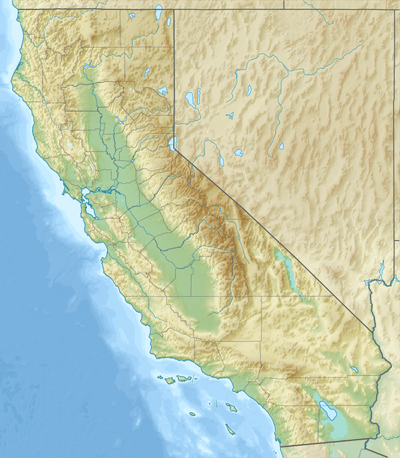Santiago Formation, California
The Santiago Formation is a geologic formation in Orange and northwestern San Diego County, California. The siltstones, mudstones and sandstones of the formation preserve fossils of Walshina esmaraldensis, dating back to the Late Eocene to Late Oligocene periods (Uintan to Duchesnean in the NALMA classification).[1]
| Santiago Formation Stratigraphic range: Late Eocene-Late Oligocene (Uintan-Duchesnean) | |
|---|---|
| Type | Formation |
| Lithology | |
| Primary | Siltstone, mudstone |
| Other | Sandstone |
| Location | |
| Coordinates | 33.1°N 117.3°W |
| Approximate paleocoordinates | 33.3°N 104.1°W |
| Region | Orange & NW San Diego County, California |
| Country | |
 Santiago Formation, California (the United States)  Santiago Formation, California (California) | |
Depositional environment
The only paleoenvironmental interpretation based exclusively on specimens from the Santiago Formation is a study of land snails from SDSNH locality 3276 (Member C, Oceanside, San Diego County), which found the distribution of shell sizes and shapes to be consistent with interpretations of subtropical to tropical conditions and paleotemperatures in excess of 25 °C (77 °F).[2]
gollark: Lua is nice, but Doom is more portable.
gollark: Remove DST.
gollark: Oh, or compile to Doom.
gollark: Just compile to WASM. Everything runs WASM.
gollark: Æ, but interesting.
References
- Kelly Ranch Core at Fossilworks.org
- López Torres et al., 2018, p.5
Bibliography
- López Torres, S.; M.T. Silcox, and P.A. Holroyd. 2018. New omomyoids (Euprimates, Mammalia) from the late Uintan of southern California, USA, and the question of the extinction of the Paromomyidae (Plesiadapiformes, Primates). Palaeontologia Electronica 21. 1–28. Accessed 2020-03-15.
Further reading
- Prothero, D.R. 2001. Magnetic stratigraphy of the middle-upper Eocene Santiago Formation, Orange and San Diego Counties, California. Guidebook, Pacific Section, Society of Economic Paleontologists and Mineralogists, 91:107-118
This article is issued from Wikipedia. The text is licensed under Creative Commons - Attribution - Sharealike. Additional terms may apply for the media files.